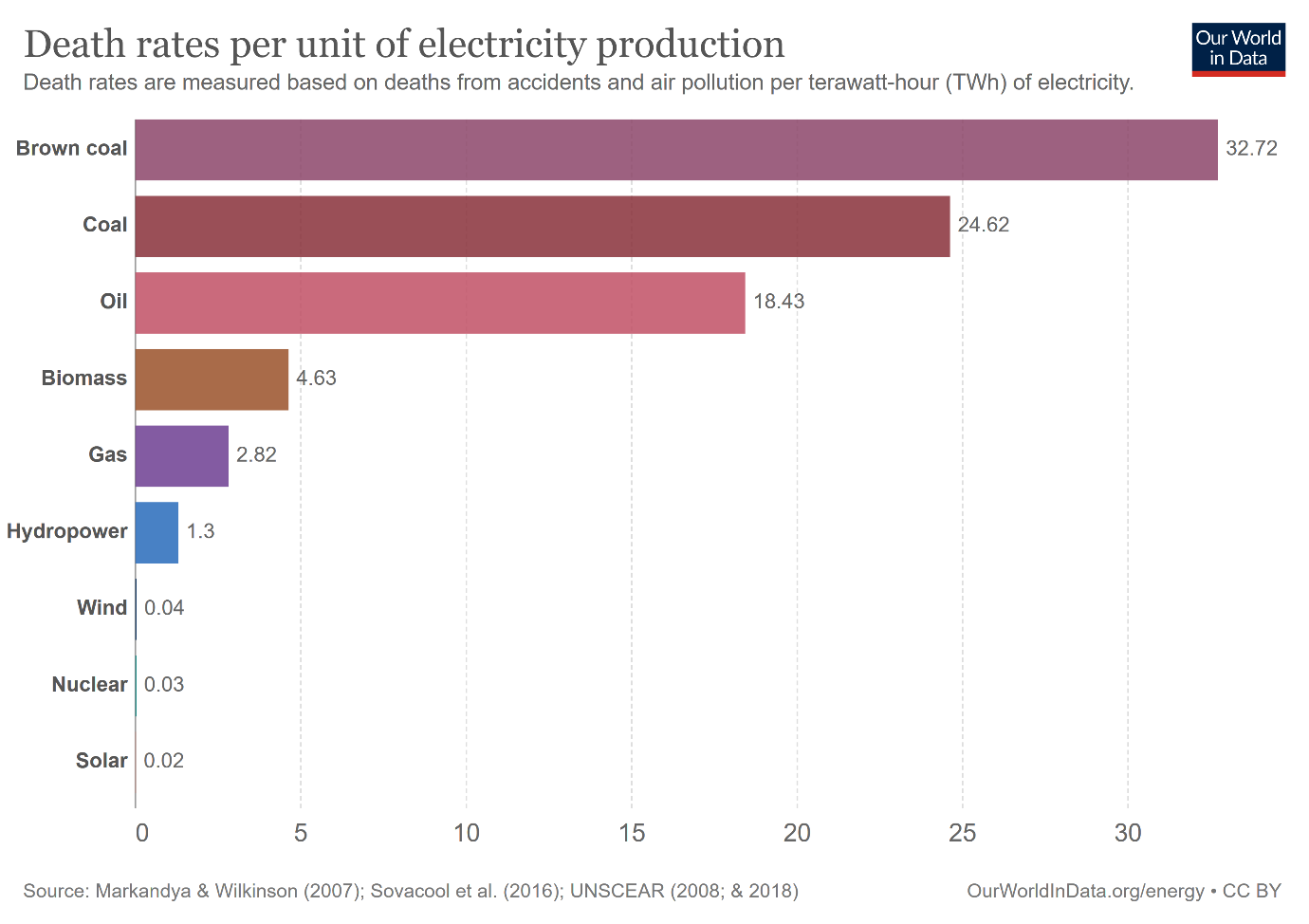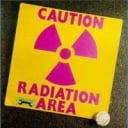Normally I’m not a “lesser of two evils” type, but nuclear is such an immensely lesser evil compared to coal and oil that it’s insane people are still against it.
Especially when you start counting the number of people that have died either directly or indirectly from coal, oil and every fossil fuel.
If your extrapolate the data into the next hundred years … fossil fuels will have responsible for the deaths of billions.
Compared to nuclear energy … fossil fuels is killing us slowly and will kill us all if we don’t stop using them.
Coal plants gives more radiation through radioactive mercury as a left over from processign
For the love of everything, at least let’s stop decommissioning serviceable nuclear plants.
Looking at you, Germany…
For real, God forbid we keep the actual safe, clean nuclear plants running
If the Great Filter theory is correct, climate change will most likely be our Great Filter.
Our species is simply not equipped with the ability to deal with the problems it created. Many people can, but they’re not powerful to do anything, and there’s too many uneducated people for the masses to rise up about this problem.
We think so short term, it’s impossible for some people to think about the future and accept that we’ll need to change the way we live now so that we can keep living then. They’re hung up on Chernobyl because it was a big bang that killed lots of people at once and it was televised everywhere that has a society and TVs, but they are unable to see that in the long term coal and gas have killed and are still killing way more people than nuclear accidents, because it’s a process that’s continuous and kills people in indirect ways instead of a big blast.
Coal has the same yearly death toll and chernobyl’s total death toll. 80,000.
Holding up coal as a strawman argument in support of Nuclear power is a fallacy. Both are massively toxic in different ways. One does not legitimize the other.
Climate change isn’t really an existential threat. To be a filter it has to kill all humans and even the bleakest models don’t predict that.
Also for it to be a Great Filter it has to be something that ALL civilizations do to kill themselves. Seems unlikely that all civs wou ld even have analogs to gossil fuels in quantities sufficient to do this kind of damage. And the idea that zero of them actually course-correct when they notice it seems equally implausible
Anti-nuclear people in here arguing about disasters that killed a few k people in 50 years. Also deeply worried about nuclear waste that won’t have an impact on humans for thousands of years, but ignoring climate change is having an impact and might end our way of life as we know it before 2100.
They’re bike-shedding and blocking a major stepping stone to a coal, petrol and gas free future for the sake of idealism.
The biggest enemy of the left is the left
The biggest enemy of the left is the right, it’s just that everyone on the left can agree that they’re terrible so it doesn’t come up in discourse too much, whereas the people who are on your side but want to do things a different way will take up much more of your attention.
People tend to overrate the harms from potential changes, while simultaneously vastly underrating the harms that already exist that they’ve gotten used to.
A lot of the anti-nuclear sentiment comes from the 80s when the concerns were a lot more valid (and likely before half the pro-nuclear people in this thread were born).
But blaming people on social media for blocking progress on it is a stretch. They’re multi-billion dollar projects. Have any major governments or businesses actually proposed building more but then buckled to public pressure?
Anyway, I’m glad this conversation has made it to Lemmy because I’ve long suspected the conspicuous popularly and regularity of posts like this on Reddit was the work of a mining lobby that can’t deny climate change anymore, but won’t tolerate profits falling.
Mining lobby? You realize that most of what is mined are the roughly 2 billion tons of iron ore annually. While uranium mining is what… 50,000 tons a year?
There is no version of Earth where mining executives say “It’s fine, our profits are already profitable enough”.
Astro-turf is cheap and uranium is expensive – something you conviently left out to focus purely on tonnage, which bears little relation to profitability.
My parents, who are boomers, are vocally anti nuclear because when they were children through young adulthood, had weekly nuclear drills. Stop, drop and roll. They thought it was ridiculous, and believe that all nuclear technology should be destroyed as it leads to nuclear weapons. They also strongly believe that the human race will make itself extinct in a nuclear war any moment now.
Isn’t the main worry the “side product” of weapons grade nuclear materials?
I don’t have the sources right now, but nuclear reactor designs exist that output minimal weapons grade materials and some that output none at all. IIRC they are in use already, but I’d have to check what their names are.
Yes. It’s possible, but they are not of interest to nuclear power states.
There are nuclear plants in operation today that do not use or create any fuel that is capable of being weaponized. In fact, coal plants emit more radiation than a modern nuclear power plant.
There are nuclear plants in operation today that do not use or create any fuel that is capable of being weaponized.
And they cost too much. Governments only fund weaponizeable fission.
In fact, coal plants admit much more radiation than a modern nuclear power plant.
Not in a way that can be concentrated and weaponized.
Kyoto was in 1997. 2030 is 33 years, you can’t seriously consider 1.5 generations is a sprint.
Which, by the way, there is almost no conceivable way we are going to meet the 2030 deadline to maintain 1.5C. We have to think longer term.
There still is no zero emissions technology for long haul airlines, shipping, or pouring concrete for infrastructure. Those are all huge emitters.
I am not sure when the narrative around nuclear power became nuclear energy vs renewables when it should be nuclear and renewables vs fossil fuels.
We need both nuclear and renewable energy where we try to use and develop renewables as much as possible while using nuclear energy to plug the gaps in the renewable energy supply
Easy, by paying people to spread misinformation.
That’s the “how”. The other commenter was unsure about “when”.
A decade ago I’d agree with you. But given the amount of time needed to get a nuclear power plant online, if we tried to use nuclear to replace fossil fuels, it’ll probably be too late. Add to that the fact that the cost of wind and solar has dropped significantly and the fact we’d be trading dependency on resources from a group of unstable countries to a dependency on resources from another group of unstable countries, it just seems like nuclear just isn’t a very good option any more.
Of course there could be a tech change (like fusion) which alters this, but the days of fission are past. Keep the plants that are currently operational going, and if there’s construction near completion, then sure. But I feel like fission has become a bad option for new developments. Takes too long and there’s better solutions available that don’t depend on resources from other countries.
It’s going to take decades to decarbonize, the current Paris accord 2030 goal will not be met at all. Biden has set a target date for the US for 2050 to achieve net zero. That’s 37 years away.
Currently we’re going in the opposite direction:
“The Production Gap 2021 report states that world governments still plan to produce 110% more fossil fuels in 2030 (including 240% more coal, 57% more oil and 71% more gas) than the 1.5 degree limit.[118]”
People are talking about solving climate change as a sprint, but really it’s a marathon. In fact, we don’t even have the technology to fully decarbonize all sectors. It’s going to take an “all hands on deck” approach and yes, will cost trillions of $$$ to achieve.
I’m pretty doubtful that we will achieve net zero energy and zero carbon before the end of the century. The first 50% of emissions reductions will be the easiest of the low hanging fruit; each successive % reduction will be that much harder and more expensive to achieve.
Tying back to your comment, each nuke plant permanently displaces millions of tons of CO2 emissions per year.
Cause once again no one can see the potential advancements nuclear technology can have if it had proper investment. Everyone see’s Chernobyl and Fukushima and then they switch off.
Yes Renewables are better than nuclear for the moment but to demonize and not even discuss it is just burying your head in the sand
Nuclear power is neither safe nor ecologically sustainable. The waste is immensely toxic for hundreds of thousands of years. The model is centralized so wealthy oligarchs own the power source and sell it to everyone else. Better to move toward distributed power generation that isn’t massively toxic. Greenpeace must stay anti-nuke.
That’s a big no from me dog. I barely trust the government as it is, no way I’ll trust them with nuclear power plants. And besides we have vastly better options such as solar.
I read the 2 year old headline as 'unless green peace arms itself, countries will never take the environment seriously.
Nuclear energy is a terrible idea in both a physically (climate change) and socially destabilizing world.
Even Gen4 proliferation-resistant reactors still represent a lethal threat in the event of a release of fissionable materials into the local environment. Building a nuclear reactor without a cast-iron guarantee that there will be a supply of engineering staff, components, materials and clear strong regulation to keep it running safely is a surefire path to disaster.
Whilst the technology and physics behind it are well understood, we have shown time and again in a few short decades of utilizing this technology that we lack the responsibility in our administrative structures to properly manage the risks.
It would take just one full-on reactor meltdown or disaster to poison an entire continent. We have consistently demonstrated that we cannot responsibly assume that risk, which is why there is opposition to nuclear power.
If you want to avoid bad things from happening, do not deploy a dangerous technology and instead focus on what we can do. Renewables are more than capable of providing for our energy needs, and the big kicker here is that they can do so without putting the literal power “off” switch in the hands of the grid or plant operator.
Greenpeace was founded to be an anti-nuclear organization. See, most of the founding members were members of the Sierra Club (another environmentalist organization) but the Sierra Club was actually pro-nuclear power. The Sierra Club was actually fighting against the installation of new dams due to the effect of wiping out large swaths of river habitat and preventing salmon runs and such.
Anyway, in 1971 there was an underground nuclear bomb test by the US government in an area that was geologically unstable. (there were a bunch of tests to see just how geologically unstable). Protesters thought that the test would cause an earthquake and a tsunami.
Anyway, the people who were unhappy with the Sierra club not actively protesting nuclear power, wanted to protest this nuclear bomb test too, so they formed an organization called the “Don’t make a wave committee”. They sued, the suit was decided in the US’s favor, the test went off, and no earthquake happened (which is how the earlier tests said it would go).
At some point, the “Don’t make a wave committee” turned into Greenpeace.
Also about this timeframe, Greenpeace started receiving yearly donations from the Rockefeller Foundation.
The Rockefeller Foundation is the charitable foundation created by the Rockefeller heirs that “uses oil money to make the world a better place” but they kind of don’t. They’ve been anti-nuclear since the beginning, and even directly funded some radiation research in the 1950s that lied about safe exposure limits to radiation, claiming that there was no safe limit. That research went on to shape international policy, and by the time new research came out, the policy was already written and thus hard to change.
As a side note, another alumnus of the Sierra Club was approached by the then CEO of Atlantic Oil and directly paid a sum of something like $100k (in 1970 money) to found another anti-nuclear environmentalist organization called Friends of the Earth.
I live less than 2 miles from the last remaining coal power station in England.
I would much rather have nuclear instead of a chimney chucking god knows what into the air (and subsequently into me) for my entire life.
Fun fact, coal plants produce more radiation into their environment than nuclear plants
Modern reactor designs are so damn safe it’s insane
If they are so damn safe why i can’t build one in my backyard?
Because the radioactive bits need to be handled by trained and trusted personnel because if those bits fall into the wrong hands they can be used for some horrible shit
so are you saying that it is not safe?
If I install solar panels and the inverters incorrectly I could potentially harm or kill myself and others. Therefore solar isn’t safe.
But then why you can build these in your garden and not nuclear?
Such a dumb question.
Building a nuclear power plant requires the collaboration of physicists, nuclear + electrical + civil engineers, etc…
Solar requires a certified electrician.
We know how to build nuclear safely, it just requires a lot more effort and oversight, therefore is not something you can build at home.
Cue the nuclear shills that will handwave away any legitimate concern with wishful thinking and frame the discussion as solely pro/anti fossil, conveniently pretending that renewables don’t exist.
ETA:
Let’s look at some great examples of handwaving and other nonsense to further the nuclear agenda.
Here @danielbln@lemmy.world brings up a legitimate concern about companies not adhering to regulation and regulators being corrupt/bought *cough… Three Mile Island cough*, and how to deal with that:
So uh, turns out the energy companies are not exactly the most moral and rule abiding entities, and they love to pay off politicians and cut corners. How does one prevent that, as in the case of fission it has rather dire consequences?
So of course the answer to that by @Carighan@lemmy.world is a slippery slope argument and equating a hypothetical disaster with thousands if not millions of victims and areas being uninhabitable for years to come, with the death of a family member due to faulty wiring in your home:
Since you can apply that logic to everything, how can you ever build anything? Because all consequences are dire on a myopic scale, that is, if your partner dies because a single electrician cheaped out with the wiring in your building and got someone to sign off, “It’s not as bad as a nuclear disaster” isn’t exactly going to console them much.
At some point, you need to accept that making something illegal and trying to prosecute people has to be enough. For most situations. It’s not perfect. Sure. But nothing ever is. And no solution to energy is ever going to be perfect, either.
Then there’s the matter of misleading statistics and graphs.
Never mind the fact that the amount of victims of nuclear disasters is underreported, under-attributed and research is hampered if not outright blocked to further a nuclear agenda, also never mind that the risks are consistently underreported, lets leave those contentious points behind and look at what’s at hand.Here @JohnDClay@sh.itjust.works shows a graph from Our World in Data that is often thrown around and claims to show “Death rates by unit of electricity production”:

Seems shocking enough and I’m sure in rough lines, the proportions respective to one another make sense to some degree or another.
The problem however is that the source data is thrown together in such a way that it completely undermines the message the graph is trying to portray.According to Our World in Data this is the source of the data used in the graph:
Death rates from energy production is measured as the number of deaths by energy source per terawatt-hour (TWh) of electricity production.
Data on death rates from fossil fuels is sourced from Markandya, A., & Wilkinson, P. (2007).
Data on death rates from solar and wind is sourced from Sovacool et al. (2016) based on a database of accidents from these sources.
We estimate deaths rates for nuclear energy based on the latest death toll figures from Chernobyl and Fukushima as described in our article here: https://ourworldindata.org/what-was-the-death-toll-from-chernobyl-and-fukushima
We estimate death rates from hydropower based on an updated list of historical hydropower accidents, dating back to 1965, sourced primarily from the underlying database included in Sovacool et al. (2016). For more information, see our article: https://ourworldindata.org/safest-sources-of-energy
Fossil fuel numbers are based on this paper which starts out by described a pro-nuclear stance, but more importantly, does a lot of educated guesstimating on the air-pollution related death numbers that is straight up copied into the graph.
Sovacool is used for solar and wind, but doesn’t have those estimates and is mainly limited to direct victims.
Nuclear based deaths is based on Our World in Data’s own nuclear propaganda piece that mainly focuses on direct deaths and severely underplays non-direct deaths.
And hydropower bases deaths is based on accidents.
So they mix and match all kinds of different forms of data to make this graph, which is a no-no. Either you stick to only accidents, only direct deaths or do all possible deaths that is possibly caused by an energy source, like they do for fossil fuels.
Not doing so makes the graph seem like some kind of joke.
Why go nuclear when renewable is so much cheaper, safer, future proof and less centralised?
Don’t get me wrong. Nuclear is better than coal and gas but it will not safe our way of life.
Just like the electric car is here to preserve the car industry not the planet, nuclear energy is still here to preserve the big energy players, not our environment.
As a bit of a “young climate activist” myself (certainly more of a jaded, realistic one) , nuclear is still a bad idea. We don’t need a overabundance of electricity, we need more sustainable energy. The last thing we should be doing as environmentalists is giving governments and capitalists more resources to weaponize- ntm more opportunities to critically fuck up our planet. Yes, nuclear energy CAN be produced totally safely. However, from a logistics standpoint this depends on keeping a number of factors in check and one has to account for the materials involved. Storage of nuclear waste is already a problem on planet earth. The U.S has bunkers full of this sludge that will kill anyone who gets close- Not to mention how unethical industry practices are when it comes to mining on a world wide scale!














